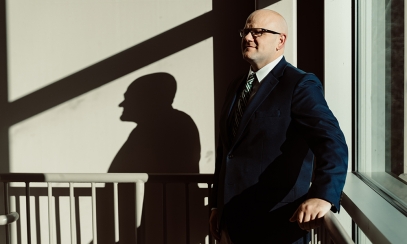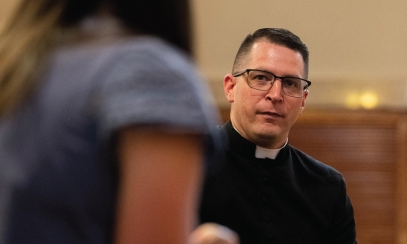Las Posadas
The hispanic tradition of re-enacting Mary and Joseph's search for shelter in Bethlehem lives on in many parishes in Eastern and Central Washington
The hispanic tradition of re-enacting Mary and Joseph's search for shelter in Bethlehem lives on in many parishes in Eastern and Central Washington
It is cold and dark. Outside a door, a small group of pilgrims huddle together. They knock, and, when the door opens, they begin to sing.
“En el nombre del cielo os pido posada pues no puede andar mi esposa amada.” In the name of Heaven I ask you for shelter, for my beloved wife can go no further.
After listening to the plea, the people who opened the door sing back in response.
“Aquí no es mesón, sigan adelante yo no debo abrir, no sea algún tunante.” There's no inn here, go on with you, I can't open up, you might be a rogue.
The door shuts in their faces, and they move on.
This is the first stop along the way of Las Posadas, a Hispanic cultural tradition that brings to life the rich imagery our Catholic faith has to offer.
“Las Posadas is a reenactment of Mary and Joseph trying to find lodging when they get to Bethlehem,” said Elida Fernandez, secretary at St. Vincent parish in Connell. Fernandez, who has been involved in Las Posadas for most of her life, has both organized the event and attended as a participant.
“We have children or adults dress up as Mary and Joseph,” Fernandez said. “Some people go full-bore with a real donkey, and sometimes they will even use a pregnant woman. In our parish, we try to always have children because we want it to be meaningful for the kids. It’s another level or way they can experience where our faith comes from and the great sacrifices that Mary and Joseph—and consequently Christ—made for us.”
After the first rejection, the pilgrims move on to the next stop along their journey. Another door opens for them, and later, a third. Their request for lodging is again rejected. Then, at the fourth and final door, they are welcomed with open arms.
“¿Eres tú José? ¿Tú esposa es María? Entren, peregrinos, no los conocía.” Are you Joseph? Your wife is Mary? Enter, pilgrims; I did not recognize you.
The tone shifts abruptly from one of desperation and longing to one of great joy. Inside, the pilgrims receive food and drink. The celebration that follows will last for hours into the night.
“The gathering can be very simple,” Fernandez said, “hot chocolate, a piece of sweet bread; after that you socialize a little bit and everyone goes home.”
In other cases, the celebration turns into a full-blown fiesta. Pinatas are common, and traditional foods include atole — a creamy, porridge-like beverage sweetened with cinnamon and brown sugar — tamales, and sweet bread.
Las Posadas is typically celebrated for nine days, from Dec. 16 until Christmas Eve. In some places, the final night ends with Midnight Mass, and each request for lodging leads gradually toward the church. It is common to see 400 or more pilgrims processing through the streets with lighted candles.
The tradition is slightly different here in Central Washington than in Hispanic countries, but the spirit remains the same. There are generally fewer participants, and, in most cases, the procession is absent entirely.
Cold weather is perhaps the largest hurdle that Central Washington parishes must navigate.
“If we have bad weather, it makes it really hard to have kids outside,” Fernandez said. In many cases, the whole procession is done inside church facilities. Pilgrims travel door-to-door, rather than house-to-house.
Even so, Las Posadas is an irreplaceable part of Central Washington Hispanics’ cultural tradition.
“The Posadas represent two major things for the Hispanics here,” Fernandez said. “One, it’s the carrying forth of our faith; and two, it brings families together to share traditions.”
Raquel Aguilera, children’s faith formation coordinator at St. Patrick’s parish in Pasco, added that Las Posadas is a piece of home for Hispanic families who might otherwise feel out of place.
“It is a cultural tradition that we bring from our country of origin,” Aguilera said. “Getting to such a distant place and finding that your traditions are celebrated is something that causes infinite joy and makes you part of that place.”
Though the celebration is culturally Hispanic, Las Posadas offers a chance for community members of all backgrounds to experience the unity and joy that comes from celebrating a 400-year-old tradition.
“I would really encourage anyone who hasn’t experienced a Posada to go and experience it,” Fernandez said. “You might not understand all the language, but we can recommend a booklet and you can follow along. The fellowship that happens afterwards, when everyone is together and they’ve just shared scripture, is beautiful.”
For Hispanics, Las Posadas is filled with nostalgia, but the joy that the tradition imparts is universal. Las Posadas is a reminder that Christ came into the world, not as a king, but as a member of the poor and unwanted.
“I think ideally,” said Fernandez, “if we have kids growing up in this country — whether we are Anglo or whether we are Hispanic — tradition is what holds us together, not just in our faith, but also as a community.”



